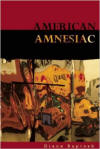American Amnesiac
How would it feel to suddenly find huge distortions in your memories of your own life, and then sense ripples of distortion when looking at the story of the world all around? The narrator of Diane Raptosh’s American Amnesiac speaks from within the swirl of such an ongoing confusion: “I’m a man without a past, like so many folks who’ve been expelled / from their own but dare not detect it. Shake your head no; nod your head yes. // There’s enough amnesia out there to kill a horse. . . .”
How would it feel to suddenly find huge distortions in your memories of your own life, and then sense ripples of distortion when looking at the story of the world all around? The narrator of Diane Raptosh’s American Amnesiac speaks from within the swirl of such an ongoing confusion: “I’m a man without a past, like so many folks who’ve been expelled / from their own but dare not detect it. Shake your head no; nod your head yes. // There’s enough amnesia out there to kill a horse. . . .”
The interplay between what is out there in the world and what is in here in the storage of memory and detail in a mind makes for a unique book of lyrical narrative poetry. I love that Raptosh chose the book-length long poem form for this work, as the lack of titles feels well-suited for a focus on a character constantly engaging in new versions of the same quest to sort it all out. I picture him in a rehab center (sometimes a nurse named Roxanne is mentioned) with newspapers and puzzle books on his bedside table, both of which are the triggers for several poems. The narrator has been told a number of details about his former life that don’t really ring a bell with him, such as a past as an art historian and also as a financial consultant for Goldman Sachs, and such as his name, Calvin J. Rineheart. Yet he feels more at home with the anonymity of John Doe, saying, a few poems in: “Please don’t call me Rineheart, as I do not recognize / the name.” He does feel deeply connected to memories of times shared with his wife Lisette, even though he notes: “friends and loved ones have it that I never married.”
Raptosh creates a fascinating character since even with his own sense of holes and spaces in his own story, this narrator is passionately convinced of the memories he does have and cherishes the images and stories they’ve left him with: “My marriage was hidden from friends and family. / Ours was a wild domesticity . . . / Twice a month we’d slather each other in edible body glitter.” There is a richness of detail, and language is key to the whole endeavor of claiming bits of the past (or of the now) with any certainty. One section in the middle riffs on questions about this country the narrator lives in:
is the united states a christian nation
is the united states a corporation
is the united states a demo
is the united states a democracy
It breaks away from a long sequence of such apt phrase pairings with a comment like an aside in a letter to a friend: “Last night I was looking for bean recipes. I forgot how to spell fagioli. // The laptop came at me with its unease: Did you mean: fragile?”
“What means what?” in a country and time with its own unease and identity confusion: this kind of social/political question thrums along and under all of the other identity musings at the heart of this book. Early on, this thought bubbles up in narrator’s musings: “The corporation in its artificial skin, has gained rights once granted / only to natural persons. Am I, John Doe, one of them?” A question like that from a speaker who has fallen through the stitching of his own life makes for a fresh take on the concept of “the body politic.” What is anyone’s place in this country or even in our own lives? To quote Raptosh’s memory-ruptured narrator: “The rational mind’s the moon we trust—but through it / ululates mirage. No knowing is neutral.” Details of the past and present—from names of famous people with handlebar mustaches like the narrator, to news of a landfill floating in the ocean, to possible statements bloggers are sharing about the life of Calvin J. Rineheart—commingle on the page in surprising ways, and every page contained lines that resonate.
The wide net of wonderings about self and others in American Amnesiac is a riddle of lyrical music, richly layered and exhilarating as the narrator tries to make sense of it all: “O BFFs / from this unfinished planet, it’s such clean joy to curate who I say I’ll be.” The substance and form of this book-length poem, the third published work from this author, echo like a modern-day variation on Whitman’s “Song of Myself.” Diane Raptosh has written one of the most strikingly alive poetry books I have read in recent years.





